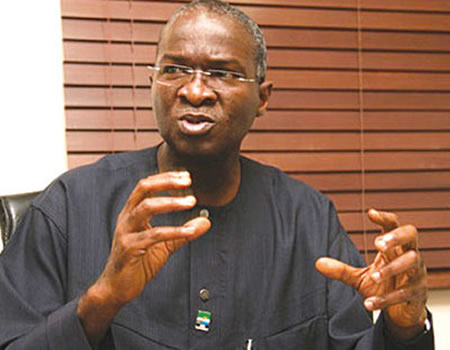The minister instructed NERC to enforce the contract of Discos to supply meters and act to ensure the urgent speedy supply and installation of meters with a view to eliminating estimated billing and promote efficient industry and market structures.
Fashola, who said the improvement in their distribution equipment and increase in capacity would enable the Discos take up the available 2,000MW difference between the generation capacity of the Gencos and the distribution capacity of the Discos, also directed the regulatory commission to stop Discos from threatening private entrepreneurs from entering the market to supply consumers whom they are unable to supply.
Instead, according the minister, such entrepreneurs should be licensed by the commission subject to its terms and conditions “in order to promote competition and private sector participation and avoid a private monopoly of power.”
Meanwhile, Fashola has also urged NERC to tell discos to “stop threatening private entrepreneurs.”
In a statement by the Federal Ministry of Power, Works and Housing, Fashola instructed NERC to stop discos from threatening other investors from making entry into the market to supply consumers whom they (Discos) are unable to supply electricity.
According to Fashola, instead of threatening, such entrepreneurs should be licensed by the commission subject to its terms and conditions “in order to promote competition and private sector participation and avoid a private monopoly of power.”
He added that as clearly stated in Section 71(6) of the Electric Power Sector Reform Act (EPSRA) dealing with Terms and Conditions of licenses, “no exclusivity or monopoly was intended for a license holder such as Gencos or Discos.”
The aforementioned Section states that, “Unless expressly indicated in the license, the grant of a license shall not hinder or restrict the grant of a license to another person for a like purpose and, in the absence of such an express indication, the licensee shall not claim any exclusivity, provided that the commission may allow a licensed activity to be exclusive for all or part of the period of the license for a specific purpose, for a geographical area, or for some combination of the foregoing.”
Noting that the regulatory commission has not issued any such exclusive license to any Disco, Fashola declared, “If we take into consideration that, after five years of privatisation, there are still people and businesses who do not have power or enough power, common sense and public interest demands that we must not resist ordinary people, small businesses like shops and markets from seeking alternative sources of energy.
“The truth is that they already have these sources of alternative energy, in small petrol and diesel generators that cost them about N100 per kilowatt hour. If the DISCOs are not resisting the generator sellers who are contributing to pollution, what is the logic of resisting small entrepreneurs bringing mini gas plants to supply a market need?”, the Minister argued, pointing out that for now, the nation’s developmental needs could not wait “for businessmen who are not yet ready to serve.”
Urging NERC “to act with dispatch,” Fashola said the stated policy statements were made in the National interest, public good, the need to support small businesses, provide access to power for ordinary people and increase productivity adding, however, that although he was not unmindful of concerns about loss of market or customers by Discos such concerns must be balanced against national interest and that with improvement in their businesses, they would be in a position to use their economies of scale of large volumes of power to buy out or out-price the small entrepreneurs.
The minister implored members of the public who seek more information
“to get a copy of EPSRA and read its simple provisions”, adding that the Act confers extensive regulatory powers on NERC “including the power in Sections 73 and 74, to amend or cancel a license if the licensee is unable to discharge the duties and obligations imposed by the license.”
WATCH TOP VIDEOS FROM NIGERIAN TRIBUNE TV
- Let’s Talk About SELF-AWARENESS
- Is Your Confidence Mistaken for Pride? Let’s talk about it
- Is Etiquette About Perfection…Or Just Not Being Rude?
- Top Psychologist Reveal 3 Signs You’re Struggling With Imposter Syndrome
- Do You Pick Up Work-Related Calls at Midnight or Never? Let’s Talk About Boundaries







